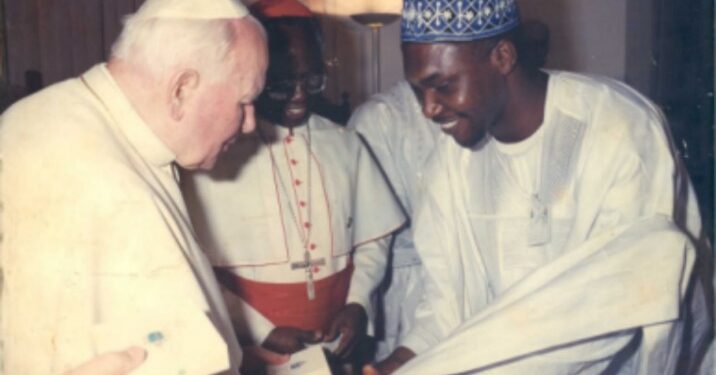By Osita Chidoka
In Part 1 of my tribute to Late Gen. Useni, I recounted how armed with just ₦20 and a dream, I arrived at the NYSC camp in Abuja. Through unwavering determination and a successful community development project, I earned the NYSC FCT Award. This recognition led to automatic employment, thanks to the presence of General Jeremiah Useni at our Passing Out Parade. That moment marked the beginning of a transformative journey under his leadership.
A Pivotal Redirection
On December 14, 1996, I commenced work at the Federal Capital Development Authority (FCDA), earning a monthly salary of ₦1,300. As a Business Management graduate, I was initially posted to the Finance Department. During my documentation process, the head of the unit I was assigned to reviewed my forms, paused, and then looked at me intently. He said, “I don’t think the Finance Department is a good fit for you. I’ve observed you over the past two days and believe you won’t thrive here. Go back to Admin and ask them to post you to the Protocol Unit; you’ll be better off around the Minister’s Office.”
I was taken aback. Was I being rejected? What had I done wrong? I tried to explain my capabilities, but he remained firm, “Just go; you’ll thank me later.” I left his office, confused and somewhat angry, without even noting his name. Today, I wish I could thank that anonymous destiny changer. His refusal and genuine advice altered the course of my life.

Persistence Amidst Rejection
After a week of back and forth, the Administration Department re-posted me to the Protocol Unit. However, I faced another hurdle. The Chief of Protocol, the esteemed Sir Peter Aliu, rejected me through his secretary, stating he had already accepted four new staff and had no space for another. Undeterred, I loitered around his office for about two weeks, hoping for an opportunity to see him. Some of his staff encouraged me to persevere, assuring me of his kindness.
Eventually, I met Sir Peter Aliu. Contrary to his formidable reputation, he was soft-spoken and self-effacing. He tried to persuade me to return to Admin for another posting, but I pressed on, employing every tactic I had read about influencing people. Though initially unsuccessful, I continued to show up daily.
A few days later, he sent for me, requested my posting letter, and accepted me into the Protocol Unit. Working under Sir Peter Aliu prepared me for my future roles in life. He is patient, kind, humble, and a committed civil servant. He remained an adviser and guardian through my chequered journey in public life.
Seizing Opportunities
Assigned to a cramped office without a clear schedule, I took the initiative to create one. I approached the Chief Press Secretary to the Minister and offered to help write speeches and media releases, drawing from my experience interning at The Guardian in Lagos. I made it a point not to leave the office until Sir Peter closed for the day, gradually becoming useful in assisting him with various tasks.
One day, Sir Peter entered the office and said, “Osita, come with a pen and paper and take notes.” The meeting included the Chief of Protocol, the Director of Public Works, the Director of Lands, and the Director of Engineering. Sir Peter announced that Pope John Paul II would visit Nigeria, and the Minister had tasked the committee with planning the visit. I diligently produced the minutes and recommendations, which were forwarded to the Minister.
A few days later, Sir Peter informed me that the Minister had presented our meeting’s minutes to the Head of State, General Abacha. The Head of State directed the planning committee to be expanded into a National Committee, comprising Ministers of Foreign Affairs, Information, Health, the National Security Adviser, the Governors of Anambra, the Bishops of Abuja and Onitsha, among others.
Sir Peter instructed me to draft letters inviting all these individuals to a meeting. I prepared the letters, listing Sir Peter as the signatory. He returned the drafts, striking off his name, and said, “Write your name as Secretary; that was the Minister’s directive.” At 25, barely months into the civil service, I became the Secretary of one of the most sensitive committees in Nigeria’s diplomatic history.
Standing Firm Amidst Challenges
The first meeting was fully attended, reflecting the Abacha regime’s eagerness to use the Papal visit to bolster its international image. Ministers, the National Security Adviser, and other prominent figures were present. As Secretary, I became familiar with everyone, sitting two seats away from General Useni, who referred to me simply as “Secretary.”
After about five meetings, murmurs arose within the ministry about how a Level 8 officer, less than a year into service, could be the Secretary of such a high-profile committee. The Director of Administration entered the Minister’s conference room. He asked me to vacate the secretary’s seat, stating he would take over the role, supported by two middle-level staff members. I complied, moving to a seat at the back, noticing puzzled expressions among committee members.
When General Useni arrived, he greeted the Director and inquired, “Director, is there any problem?” The Director replied, “Sir, the meeting is very high profile, so I came to take over the Secretariat.” General Useni looked at him and said, “Director, are you not busy in your department? We have a secretary already, and we are not complaining. Please go back to your office.” The Director and his officers departed, and I returned to my seat amidst applause from the committee members.
The meetings continued for over six months, with the Coordinating Committee, comprising only the Ministers and the Bishops of Abuja and Onitsha, meeting in between. Managing these meetings was challenging, but I persevered.
A Tribute to General Useni’s Visionary Leadership
From being redirected from the Finance Department to becoming the Secretary of a pivotal national committee, this journey underscores the importance of resilience, initiative, and the impact of mentors like Sir Peter Aliu and leaders like General Useni. Their belief in merit and support for young professionals shaped my path in public service.
General Useni’s support and recognition of potential in young officers like me exemplify his leadership. His legacy continues to inspire and guide those privileged to serve under him.






